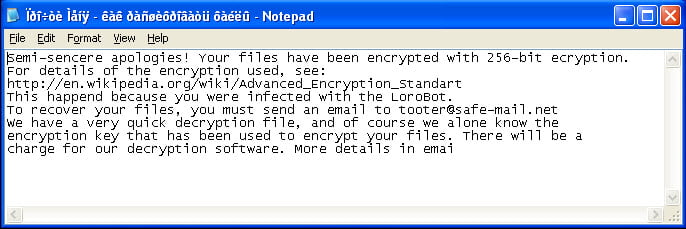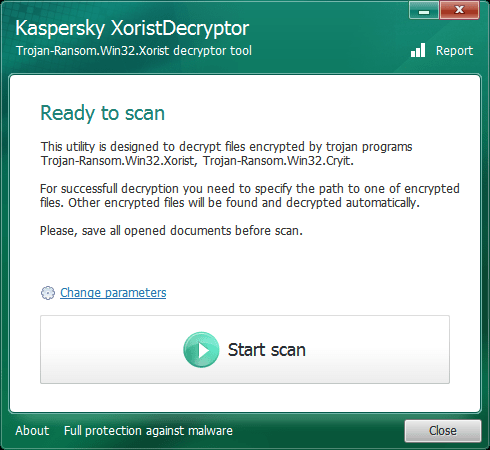Malware of the family Trojan-Ransom.Win32.Xorist gains unauthorized access to the victim computer and modifies data on it. This makes the files or the whole system inaccessible. After blocking the files, malware demands ransom. The victim is supposed to deliver the ransom to criminals and receive a tool which decrypts the data or restores normal functioning of the computer.
Signs of infection
- A message is displayed on the screen demanding the user to send an SMS to decrypt the files.
- A text file is created on disk C with the name “Read Me: how to decrypt files”.

- The Windows folder contains a file with the name CryptLogFile.txt.
- The trojan program encrypts all files with the following extensions:
doc, xls, docx, xlsx, db, mp3, waw, jpg, jpeg, txt, rtf, pdf, rar, zip, psd, msi, tif, wma, lnk, gif, bmp, ppt, pptx, docm, xlsm, pps, ppsx, ppd, tiff, eps, png, ace, djvu, xml, cdr, max, wmv, avi, wav, mp4, pdd, html, css, php, aac, ac3, amf, amr, mid, midi, mmf, mod, mp1, mpa, mpga, mpu, nrt, oga, ogg, pbf, ra, ram, raw, saf, val, wave, wow, wpk, 3g2, 3gp, 3gp2, 3mm, amx, avs, bik, bin, dir, divx, dvx, evo, flv, qtq, tch, rts, rum, rv, scn, srt, stx, svi, swf, trp, vdo, wm, wmd, wmmp, wmx, wvx, xvid, 3d, 3d4, 3df8, pbs, adi, ais, amu, arr, bmc, bmf, cag, cam, dng, ink, jif, jiff, jpc, jpf, jpw, mag, mic, mip, msp, nav, ncd, odc, odi, opf, qif, qtiq, srf, xwd, abw, act, adt, aim, ans, asc, ase, bdp, bdr, bib, boc, crd, diz, dot, dotm, dotx, dvi, dxe, mlx, err, euc, faq, fdr, fds, gthr, idx, kwd, lp2, ltr, man, mbox, msg, nfo, now, odm, oft, pwi, rng, rtx, run, ssa, text, unx, wbk, wsh, 7z, arc, ari, arj, car, cbr, cbz, gz, gzig, jgz, pak, pcv, puz, r00, r01, r02, r03, rev, sdn, sen, sfs, sfx, sh, shar, shr, sqx, tbz2, tg, tlz, vsi, wad, war, xpi, z02, z04, zap, zipx, zoo, ipa, isu, jar, js, udf, adr, ap, aro, asa, ascx, ashx, asmx, asp, aspx, asr, atom, bml, cer, cms, crt, dap, htm, moz, svr, url, wdgt, abk, bic, big, blp, bsp, cgf, chk, col, cty, dem, elf, ff, gam, grf, h3m, h4r, iwd, ldb, lgp, lvl, map, md3, mdl, mm6, mm7, mm8, nds, pbp, ppf, pwf, pxp, sad, sav, scm, scx, sdt, spr, sud, uax, umx, unr, uop, usa, usx, ut2, ut3, utc, utx, uvx, uxx, vmf, vtf, w3g, w3x, wtd, wtf, ccd, cd, cso, disk, dmg, dvd, fcd, flp, img, iso, isz, md0, md1, md2, mdf, mds, nrg, nri, vcd, vhd, snp, bkf, ade, adpb, dic, cch, ctt, dal, ddc, ddcx, dex, dif, dii, itdb, itl, kmz, lcd, lcf, mbx, mdn, odf, odp, ods, pab, pkb, pkh, pot, potx, pptm, psa, qdf, qel, rgn, rrt, rsw, rte, sdb, sdc, sds, sql, stt, t01, t03, t05, tcx, thmx, txd, txf, upoi, vmt, wks, wmdb, xl, xlc, xlr, xlsb, xltx, ltm, xlwx, mcd, cap, cc, cod, cp, cpp, cs, csi, dcp, dcu, dev, dob, dox, dpk, dpl, dpr, dsk, dsp, eql, ex, f90, fla, for, fpp, jav, java, lbi, owl, pl, plc, pli, pm, res, rnc, rsrc, so, swd, tpu, tpx, tu, tur, vc, yab, 8ba, 8bc, 8be, 8bf, 8bi8, bi8, 8bl, 8bs, 8bx, 8by, 8li, aip, amxx, ape, api, mxp, oxt, qpx, qtr, xla, xlam, xll, xlv, xpt, cfg, cwf, dbb, slt, bp2, bp3, bpl, clr, dbx, jc, potm, ppsm, prc, prt, shw, std, ver, wpl, xlm, yps, md3.
How to disinfect the system
- Download the XoristDecryptor.exe file and run it on the affected computer.
- In the Kaspersky XoristDecryptor window, click Start scan.

What to do if the utility did not help
In case an unknown malicious file was detected, the XoristDecryptor utility prompts you to send the file to [email protected]. Kaspersky specialists will analyze the file and update databases of XoristDecryptor. At the next launch, the utility will download new databases and disinfect the files.
Sending the malicious file to Kaspersky will not only solve your problem but will also help other users who may get affected by file-encrypting ransomware.
If XoristDecryptor was unable to decrypt the files, try using RectorDecryptor and RakhniDecryptor.
To eliminate the risk of being affected by ransomware, install Kaspersky Internet Security and turn on its Protection against screen lockers feature. For instructions, see this article.
Source : Official Kaspersky Brand
Editor by : BEST Antivirus KBS Team

